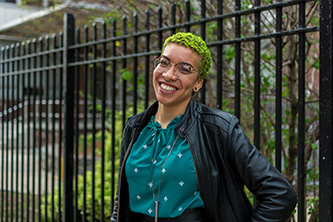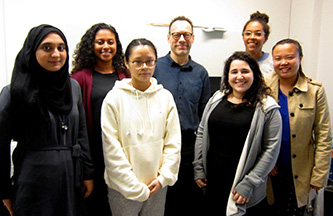Our Students

Niani Jones
Niani N.N. Jones, B.A. Sociology, 2018
"I can count on one hand the number of black professors I've had, from elementary school until now," says Niani Jones, a Brooklyn College senior determined to rebalance a long-lived inequality. "Black people are hugely underrepresented in academia and being in Mellon Mays and CUNY Pipeline, which are geared toward getting the underrepresented into grad school and diversifying the professoriate, will help me change that."
A highly accomplished sociology major, Jones has already had a bit of a taste of the academic life. In addition to her participation in the Mellon Mays Undergraduate Fellowship (MMUF) honors program, she has worked as a research assistant through the Mellon Undergraduate Research Program for Transfer Students. Jones has also presented her research on the racialized and gendered negotiations of black women and femmes in bondage, discipline, dominance, and submission (BDSM) at the MMUF New York City Regional Undergraduate Conference held this last spring at Brooklyn College. Jones sees research "as a form of resistance against what is considered to be 'legitimate' academic knowledge, as well as a form of activism." Working with her teachers on her research has led her to "realize that academia could help bring about real change in the real world" and she wants to contribute to this change.
Jones has had a number of mentors who have helped guide her education at Brooklyn College including professors Yung-Yi Diana Pan, Tamara Mose, and Donna Lee Granville. Both Pan and Granville have talked to Jones about the experience of being a woman of color in academia. Jones calls her conversations with Pan "validating and fortifying" and credits her teacher with being the one who suggested she consider going to graduate school and prepare for a career in teaching and research. Of Granville, she says, "she's been a huge influence as well. She's extremely candid about her experiences as young black woman in academia." Jones has also worked as a research assistant for Mose, whom, she says provided her with "an amazing opportunity … to see other methods of conducting research." Through Mose, Jones learned "how important it is to read the literature before diving into a new project," and that the "journey or process of researching is just as important as the outcome of your research."
Jones chose to major in sociology because it is a field that has allowed her "to learn more about her identities, as a queer black woman," and to "tailor research and activism to [her] communities." When asked what she would advise others who are questioned about the utility of a sociology degree she replies enthusiastically, "Don't listen to whoever's asking you that because you can do so much with a degree in sociology!" Jones then itemizes many possible careers, including law, social work, education, activism, and marketing. This student of the School of Humanities and Social Sciences is also happy to point out the usefulness of a social sciences background for students considering a career in health sciences or medicine. She advises that "recognizing a better understanding of black and brown/queer/low-income communities can be a great supplement" in these fields. For herself, though, Niani Jones looks forward to a career , teaching a combination of sociology/women's studies/Africana studies, perhaps even right here at Brooklyn College.

(L-R) Zaib Javaid, Lissette Vizcarrondo, Amy Wu, Professor Jonathan Nissenbaum, Daniella Shimoonov, Yasmine Sukola, and Sarah Feng
Stellar Linguistics Students
If your country wins all of the medals in a single Olympic event, you have managed to pull off a sweep. Seven countries have swept the Olympics since the beginning of the modern games. In the 2012, 200 meter dash, Usain Bolt, of Jamaica, led his countrymen Yohan Blake and Warren Weir in a three medal sweep, and more recently, in 2016, the American Brianna Rollins took gold with her team mates Nia Ali and Kristi Castlin picking up silver and bronze respectively in the 100 meter hurdles.
In academic year 2017-2018, six Brooklyn College linguistics students pulled off something of a sweep in a competition against more than 50 of their peers in undergraduate programs across New York City for a seat in the first year of the National Science Foundation (NSF) Research Experiences for Undergraduates program. These six students, Sarah Feng, Zaib Javaid, Daniella Shimoonov, Yasmine Sukola, Lissette Vizcarrondo, and Amy Wu, comprise nearly half of the cohort of 14 students participating in a research grant that comes under the broad umbrella of "The Intersection of Linguistics, Language, and Culture." More specifically, the students have the opportunity to work in various language-science fields including theoretical linguistics, first- and second-language acquisition, sentence processing, and bilingualism, speech, language and communication sciences, developmental/acquired language disorders, signed and understudied languages and other areas.
The six Brooklyn College students in the first year of this grant-funded program typify the cultural and linguistic diversity of the student body at Brooklyn College. Two are the first in their families to attend college. Two are immigrants and three were born in the U.S. to immigrant parents. The six of them grew up speaking, among them, seven native languages (in addition to two heritage languages): two were raised in trilingual households (Russian/Hebrew/English, and Urdu/Punjabi/English), and three in bilingual households (Cantonese/Mandarin, Cantonese/English, and English/Spanish).
The first cohort of students are spending this year working with mentors from Brooklyn College, Queens College, the CUNY Graduate Center, Adelphi University and Long Island University. The students are awarded a generous stipend of $6,500 for the year, for 6-8 hours a week in the fall and spring semesters, and 15-18 hours a week in the summer. They work with their mentors in state-of-the-art research facilities, such as the LIU Downtown Brooklyn Speech-Language-Hearing Clinic, the Brooklyn College Linguistics Laboratory, the CUNY Graduate Center’s Developmental Neurolinguistics Laboratory, the Endangered Language Alliance, the Haskins Laboratories, and the YVY Research Institute (located in a Head Start program that serves 3,000 children who speak 15 languages).
Professor Jonathan Nissenbaum, current director of the Linguistics Program at Brooklyn College, is mentoring Sarah Feng, Amy Wu, Yasmine Sukola and Lissette Vizcarrondo. Sarah Feng is studying the perception of Cantonese tones and continues in an earlier project as a research assistant at the CUNY graduate center in a study of language acquisition among Mandarin-speaking children. Sarah details her NSF project: “For my mentored research project, I am designing a speech perception project looking specifically at the perception of voice fundamental frequency and tone in my native language of Cantonese. I believe that this project will eventually help me reach my goal of working as an SLP in the Cantonese speaking community.”
Amy Wu is also studying Cantonese tone perception through the NSF grant, and as a linguistics major with a minor in computer science, she hopes to ultimately pursue graduate work in the field of computational linguistics. As Amy writes, “I want to pursue research in computational linguistics or natural language processing. This research project will help me develop skills in sorting through and organizing data, and a variety of other research skills. I am very happy to be gaining theoretical knowledge of a language that I grew up with but never studied formally.”
Yasmine Sukola and Lissette Vizcarrondo, Professor Nissenbaum’s other two mentees, are both doing research on the perception of prosody using Sine Wave Speech. Yasmine comments: “I always thought of research as a ‘graduate thing.’ This experience will help me decide whether to pursue graduate study in clinical SLP or in linguistic research. Even if I wind up having to go straight back to work, this experience will further develop my critical thinking and problem solving skills, and it will look great on a resume too!” Lissette is also thinking about her career in the future: “My ultimate goal is to open up a private practice in Physical Therapy/Occupational Therapy. I have already had the opportunity to assist in a research lab at BC and I am looking forward to developing and working on my own project in the area of linguistic pitch perception.”
Zaib Javaid is being supervised by Professor Gina Youmans at Long Island University in her NSF work. Her ultimate goal is to pursue graduate study in Speech Language Pathology, and to put both her education and her native language skills to work in a hospital setting with the underserved communities both in New York and in Pakistan. Zaib very much appreciates her chance to participate in the grant-funded project. “This is an excellent opportunity to work with a faculty mentor and to learn about data collection, coding, other aspects of hands-on research; this will actually be my first real experience with actual research,” she says. Daniella Shimoonov is working with Professor Isabelle Barrière at Long Island University on a first language acquisition project. She is also an intern at Yeled V’Yalda Early Childhood Center (YVY), under the supervision of Dr. Barrière. Daniella looks forward to possibilities both in work and in research, commenting, “I find it very exciting to see the material that I’m learning in classes in action in a lab that studies first language acquisition in young children. My ultimate plan is to get involved in clinical practice, but I’ll also be keeping an eye open for avenues to research.”
The students came to linguistics from different paths. While she was in high school, Daniella Shimoonov’s father developed a brain tumor and his speech therapist made a profound impression on her. Lissette Vizcarrondo interned for a year at a speech clinic in high school during which she was deeply affected by her observations of a patient who was regaining mastery of words one at a time. The speech and linguistics combination was a natural fit. Zaib Javaid had to interrupt her studies in 2013 due to an illness whose symptoms included migraines and dyskinesia. This led to a desire to understand how the brain functions, which in turn led to studies in speech and psychology. Amy Wu started college as a pre-med and needed to declare a major. She selected linguistics rather than going the more usual route as a biology major. Yasmine Sukola had originally studied to be a nurse in Ohio but, upon relocating to New York with her family, she found most of her college credits would not transfer. Speech seemed like a promising career with clinical applications; linguistics was an obvious addition. Sarah Feng originally wanted to be a school counselor and was always interested in languages. As a tri-lingual speaker, she had considered a career in translation. Eventually she decided to pursue a speech-pathology-with-bilingual-extension path after visiting a school for exceptional children where she saw first-hand how the school's speech language pathologist was able to help pre-k students.
These six students are anything but one dimensional. Sarah and Lissette both play volleyball and Lissette also does kickboxing workouts. Yasmine, Daniella and Sarah are all explorers. They like to spend time in the city, taking in the sights or visiting museums or heading further afield to Long Island or upstate to discover new places. Musical and artistic talent abound in this special cohort of linguists. Lissette and Daniella both play the piano, Zaib is learning Arabic calligraphy and Amy is a freelance illustrator working both in digital art and with ink. Yasmine, the non-traditional student, balances her studies with a job and the task of raising her son. She also is finding time to teach herself programming code (she hopes, ultimately, to be working with those with developmental disabilities, or in computational linguistics), and swears, like many of us, that she is “catching up on her two-month backlog of The New Yorker.”
Hard work has given each of these students from many different backgrounds an opportunity to participate in important research in linguistics. As they move more deeply into their discipline, they each have retained a hold on the individuals and communities that drive them towards professional excellence in their future careers.






